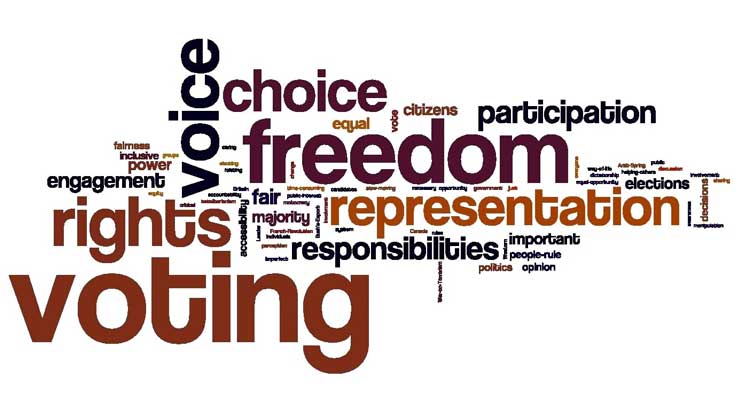
With a year to go, sustained efforts to secure integrity of 2016 election needed more than ever | Democracy, elections and voting at Democracy Chronicles
by Michael Waldman of the https://www.brennancenter.org/blog/2016-integrity-our-democracy-stake:
While it may feel like it has been going on forever, the 2016 election is one year from now. The presidency is at stake, of course. Control of the Senate, of state legislatures, and even (theoretically) of the House of Representatives is up in the air.
But in basic ways, the very integrity of our electoral system is on the ballot, too, next year. Alarmingly, we don’t even know the basic rules that will be in place — and there is more in flux than in any recent presidential year.
One other thing is certain, though: Voters are angry about the state of our democracy. And this is a critical time to yell about it.
Start with the vote. We all know that Republican-controlled states passed dozens of new lawssince 2011 to make it harder for many Americans to cast a ballot. Hardest hit: the poor, minorities, students, the elderly. These laws often have been delayed or tangled up in court. But 15 states will have new restrictions in effect for the first time in a high-turnout national election. And it is the first presidential election since the U.S. Supreme Court gutted the Voting Rights Act, the nation’s most effective civil rights law.
In many ways, this is a lawmaking moment. The Supreme Court could weigh in before the election to make clear just how much courts will protect the most sacred of democratic rights.
Possibly the justices will hear a case about the Texas voter ID law. Federal courts have already found the state’s harsh new requirement was deliberately racially discriminatory. It could come from North Carolina, where a judge has yet to rule on the state’s sweeping anti-voter law. Or Alabama, which is shutting down government offices in black communities that provide voter ID.
At the same time, new voting reforms spreading across the country could make it easier for many to vote. California and Oregon have enacted automatic registration of voters at the state DMVs, a move that could add millions to the rolls in just those states. Other states are moving forward as well. We could see the emergence of a two-tier electoral system, with some states vigorously making it harder to vote, while others finally modernize their systems.
Then there is the outsized role of big campaign money. The new role for mega-donors has drawn a lot of attention, but many people don’t realize just how big, or bad, the development. In 2014, according to Kenneth Vogel of Politico, the top 100 campaign donors gave nearly as much as the “estimated 4.75 million people who gave $200 or less” to federal campaigns,combined. In this election, so far, the role of seven-figure donors is even more pronounced, almost entirely among Republican candidates. This is not the “new normal”: these funds wereillegal in federal elections before Citizens United just five years ago.
Of course, we do not know how the money will fully unfold in the presidential race. Some candidates — Ben Carson, Bernie Sanders, to a lesser degree Hillary Clinton — are raising from small donors. A self-financing Donald Trump, for example, would not depend on other billionaires for funds. Money may matter less in a race where the whole country is watching. Where the new big money really booms loudly is in state and local races. Evidence is accumulating of the ways that untrammeled wealthy individuals now can effectively buy a town council or county government. At the lower level, it turns out, you don’t have to be a Koch brother to be a kingmaker.
Here, too, there is the possibility of immediate progress. A robust movement has pressured President Obama and Vice President Biden to put action behind their words. An executive order could require government contractors to fully disclose all their political spending. This would bring much secret money into the light, with the stroke of a pen. Yes, many in Congress might howl. But that’s just the kind of fight a political leader should relish.
Then there’s gerrymandering. A startling share of the Republican control of Congress is due to that party’s control over the redistricting process in the key year of 2011. In Pennsylvania, for example, last year Democratic candidates for Congress won more votes than Republicans, but the Republicans won 13 of 18 seats.
The rules for 2016 are also unclear here. The Supreme Court may change its definition of who should be counted under the doctrine of “one person, one vote” for legislative elections. All people (as is the case today)? Citizens? Registered voters? There are distinctly partisan consequences to this. If the Court moves away from population as the standard, it could sharply disadvantage communities with large populations of Hispanic residents.
All these factors were among the reasons that turnout in 2014 plunged to the lowest level in 72 years. We know that presidential races are different, with many more participating. But barriers to participation can tilt outcomes in close races, at all levels, even the highest.
Numerous polls show wide and deep opposition to Citizens United. Many minority voters are incensed about laws they consider to be little more than voter suppression. Candidates have begun to respond — from Hillary Clinton’s strong reforms in voting and campaign finance, to Bernie Sanders’ demand for a “political revolution,” to Donald Trump’s braggadocio that he is not bought by lobbyists, unlike other candidates. 2016 could be a year when public discontent kindles a commitment to real reform.
One year to go. Those who care about democracy have a lot to do — a lot of organizing, litigating, screaming, and amassing needed resources — to make sure that the election of 2016 is free, fair, and reflects the will of the people.
Leave a Reply